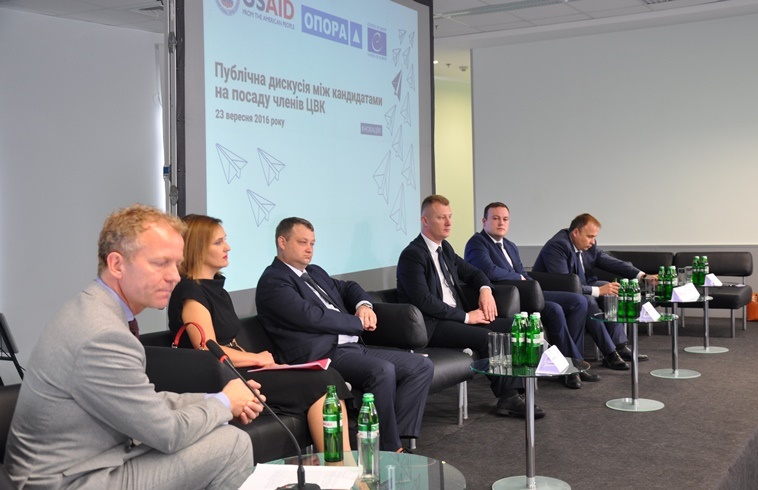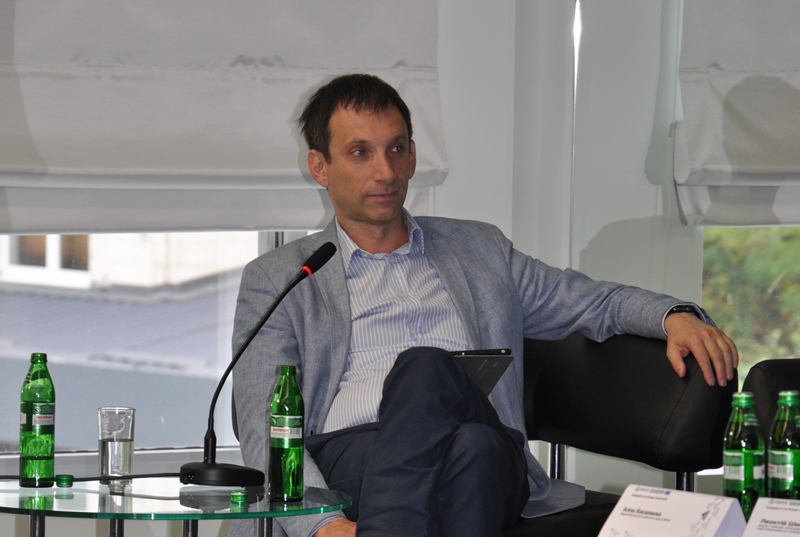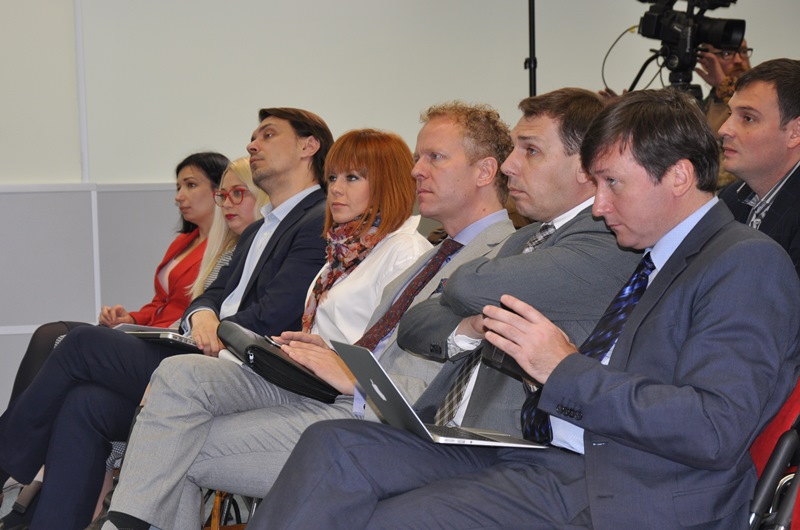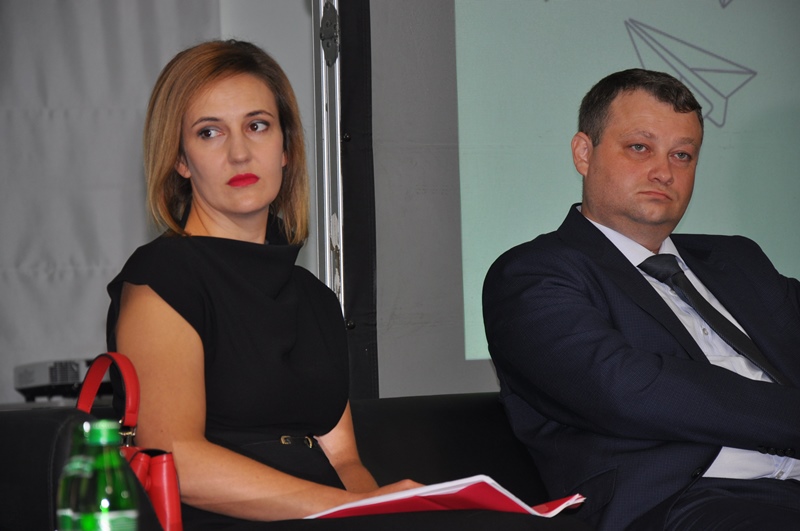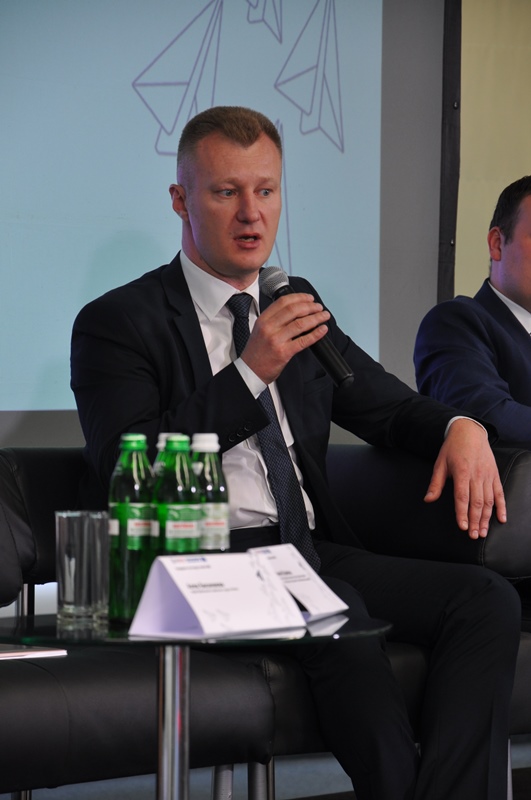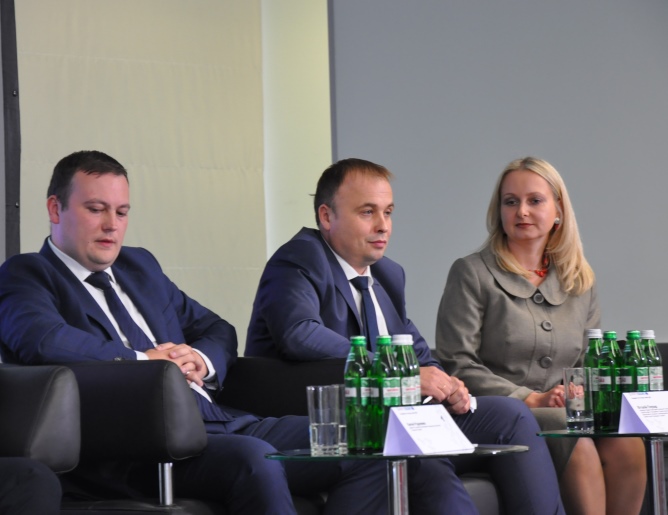Representatives of civil society, expert community, media and members of Ukrainian Parliament have learned about opinions of candidates for members of the Central Election Commission concerning important election administration issues, as well as reforming of the CEC and electoral system as a whole.
Today, on 23 September Civil Network OPORA and the Council of Europe Office in Ukraine held a public discussion involving candidates for members of the Central Election Commission, submitted by the President of Ukraine. The discussion was moderated by a famous Ukrainian publicist and journalist Vitalii Portnikov, who has stated that such events make Ukraine closer to European practices of public policy. Head of the Council of Europe Office in Ukraine Мårten Ehnberg welcomed everyone and emphasized the importance of transparency and openness of decision-making, especially concerning formation of the Central Election Commission. Head of the Board of the Civil Network OPORA Olha Aivazovska has also delivered a welcome address, and shared an expectation that this event will draw public attention to the Verkhovna Rada of Ukraine and a pressing need to legitimately appoint 12 of 15 CEC members, and will urge the deputy corps to consider submission of the President of Ukraine as soon as possible.
Only 6 of 11 candidates submitted by the President have participated in the discussion: Alla Basalaieva – Judge at Darnytsia District Court of Kyiv; Roman Hreba – Deputy Minister of Science and Education of Ukraine; Vitalii Plukar – Head of Office for Monitoring of Local Authorities Activities and Support of their Law-making Initiatives, Local Self-Government and Decentralization Department at the Administration of the President of Ukraine; Yevhen Radchenko – Development Director of the Internews-Ukraine; Nadiia Synytsia – notary public; Leontii Shypilov – Associate Professor of the International Law and Special Legal Disciplines Department at the National University of Kyiv Mohyla Academy.
According to the autobiographies presented by candidates for CEC members, they all have either experience in legal practices, or worked in election commissions or CEC Secretariat during the elections, or participated in election campaigns of political parties, or worked as independent observers and experts.
All the candidates who participated in the discussion agreed that the main election administration body Central Election Commission should be reformed.
Thus, Alla Basaieva has emphasized that public trust in CEC decisions should be restored, especially concerning the election results. She believes that district election commissions should be dissolved, that the CEC should tabulate electronic protocols delivered by PECs through a secure communication channel, which should also be accessible to public. Besides that, Alla Basalaieva emphasized on importance of an open vote count process, which would be the most efficient in electronic form (scanning), according to her. The candidate thinks the CEC should have the right to submit legislative initiatives, and that its cooperation with the courts should be improved, as long as these institutions often pass contradictory decisions on the application of the same law regulations.
Leontii Shypilov is convinced the CEC, first and foremost, must be independent and non-partisan. The candidate also thinks all three government branches should participate in formation of the Commission, despite only the President and the Parliament participate in this process today, according to current legislation. Another worthy innovation, according to Leontii Shypilov, would be rotation of managerial positions in the CEC (like in Switzerland), so that all CEC members could try management functions. He also thinks it would be good to create a scientific and advisory council under the CEC. The candidate believes Commission should engage the public more, and create expert council for joint decision-making as well as a forum on Commission's website for public discussions.
Photo: Alla Basalaieva, Leontii Shypilov
According to Yevhen Radchenko, the fact that President's submission of new CEC members lacked nominees from 3 of 6 factions and one group of MPs doesn't help to overcome the crisis in the CEC and restore public trust. The candidate has also mentioned that commission members, whose term of office has expired, should not work simultaneously with current members. The problem is not in transparency of the CEC, he said, but in the lack of public trust to its activities. The candidate believes the CEC should cooperate with parliamentary and other political parties, and party congresses should have a deliberative voice in the CEC. Yevhen Radchenko also insists that the CEC should cooperate with citizen and scientific organizations.
Photo: Yevhen Radchenko
Vitalii Plukar has mentioned three reforming directions for the CEC: structural reform in secretariat (trainings for commission members); openness and easy access to resolutions (online streaming); modern approaches to activities (non-formalistic). According to the candidate, creation of an expert council with a deliberative voice should be one of steps towards openness of the CEC as an election administration body. He has also agreed with Alla Basaieva that the CEC should have the right to submit legislative initiatives, stating that the Verkhovna Rada of Ukraine have often delayed the appointment of early elections, and the CEC could have made this process faster if it had the corresponding authority.
Roman Hreba has emphasized that it's necessary to introduce IT technologies in activities of the CEC. For example, an electronic document circulation system, which can make information exchange faster, and electronic elections in a longer perspective (10 years). The candidate is also convinced that new reformed legislation should establish liability for indirect voter bribery.
Nadiia Synytsia has stated that major problems of the CEC as an election administration body is shortage of financial and personnel resources. The candidate thinks it's important to make Ukrainian electoral legislation closer to international standards, particularly in codification, and that it's important to provide legal education not only to commission members but also to the voters. Nadiia Synytsia has agreed that we should borrow best world practices in electronic document circulation.
Photo: Vitalii Plukar, Roman Hreba, Nadiia Synytsia
Electronic voting has stirred up a discussion between candidates. For example, Alla Basalaieva said that not all settlements in Ukraine have internet, and there is a problem of identification (some citizens still have Soviet Union passports). Yevhen Radchenko stated that current technologies allow to organize electronic voting today, but the problem is public trust in such election results due to the possibility of interference.
As for the regional branches of the CEC, all the candidates agreed that such branches should be formed. Thus, Alla Basalaieva suggested that regional branches could be responsible for material and technical assistance in regions. She believes that it would be best to make the branches on the bases of regional State Voter Register maintenance bodies, and increase the quality and competence of these structures.
Leontii Shypilov said that Article 25 of the Law of Ukraine on the Central Election Commission envisages regional offices, and CEC members have been attached to the certain regions since 2007. The candidate believes that such regional offices of the CEC should have an awareness-rising mission in periods between elections, and realize the functions of “local” elections administrations, i.e. university presidents. As for the election period itself, they should become a basis for oblast TECs and train commission members.
Yevhen Radchenko, on the contrary, thinks that regional branches of the CEC will not be so necessary if open-list electoral system is established.
Vitalii Plukar has the following opinion of regional branches of the CEC: although there is such regulation in the Law on the CEC, there is no such budget item in the State Budget. Nevertheless, he believes that such branches are necessary and should be formed for training purposes.
Discussion participants were invited to assess activities of the current CEC and comment on resonant cases and the corresponding CEC decisions. Thus, all the candidates agreed that the current Commission, which have been functioning for 9 years already, have taken both unfavorable and successful steps. Most of the discussion participants have agreed that organization and conduct of three elections while the country was involved in war is definitely an achievement of the CEC, as well as completion of the State Register of Voters.
As for the minuses in activities of the current CEC, Alla Basalaieva mentioned the large number of registration refusals the candidates received in 2012-2014 due to the formalistic requirements. Leontii Shypilov said that the following CEC decisions were questionable: it didn't schedule the second round in Pavlohrad during 2015 spring elections; it delayed appointment of interim parliamentary elections in districts, which here held on 17 July 2016. Yevhen Radchenko is concerned that the CEC doesn't conduct public consultations (even though the previous CEC has also had such approach in consideration of complaints or violations of campaigning rules), doesn't conduct any scientific and research activities (compilations of court decisions), and is far from openness (conducts closed meetings and rejects access to public information). The candidate has also mentioned that activities of the CEC did not guarantee stability in local elections, i.e. there were substitutions in TECs. Vitalii Plukar has emphasized that there are double standards in activities of the CEC. For example, contradictory decisions were taken on the same basis and complaints against violation of electoral rights were considered quite formally. Roman Hreba believes the current CEC is not used to analyze its mistakes, what could have made the election process closer to international standards. Nadiia Synytsia stated that minuses of the CEC are the following: it doesn't cooperate with executive bodies (particularly migration service) and has a formalistic approach to consideration of complaints.
The discussion gave the candidates an opportunity to publicly present their opinions and themselves as specialists in electoral matters to the public and representatives of parliamentary factions, who will be able to have an opinion about each candidate during consideration of the President's submission in the Parliament, and vote for each candidate based on this opinion.
VIDEO RECORDING:
